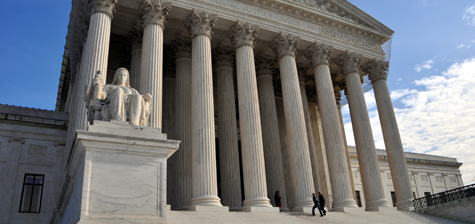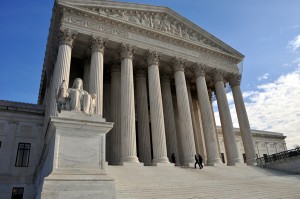National
Supreme Court declines to hear gay adoption case
Advocates say decision lets stand a ‘dangerous’ ruling

The U.S. Supreme Court announced on Tuesday it won’t hear an appeal of a case that sought to protect adoption rights for gay couples.
The court denied the petition for a writ of certiorari, which was filed by Lambda Legal, in the case of Adar v. Smith. Justices didn’t offer a comment on why they wouldn’t hear the lawsuit, which effectively ended the path for the litigation.
Kenneth Upton, supervising senior staff attorney in Lambda’s south central regional office in Dallas, said the Supreme Court is “leaving untouched a dangerous” previously issued ruling that leaves same-sex parents who have adopted or plan to adopt “treated differently from state to state.”
“By denying this writ, the Supreme Court is leaving untouched a dangerous Fifth Circuit Court of Appeals ruling that carves out an exception to the Full Faith and Credit Clause of the U.S. Constitution and to the uniformly recognized respect for judgments that states have come to rely upon,” Upton said. “This decision leaves adopted children and their parents vulnerable in their interactions with officials from other states.”
The case involves Oren Adar and Mickey Smith, a gay couple who in 2006 adopted their Louisiana-born son in New York, where a judge issued an adoption decree. In 2007, the couple attempted to obtain a new birth certificate for their child in part so Smith could extend his health insurance coverage to his son.
However, State Registrar Darlene Smith wouldn’t issue a certificate with both adopted parents’ names, saying Louisiana doesn’t recognize adoption by unmarried parents.
In October 2007, Lambda filed a lawsuit on the basis that the registrar was violating the U.S. Constitution’s Full Faith and Credit Clause and Equal Protection Clause. Lambda argued that under the Full Faith and Credit Clause, judgments issued by a court in one state, such as New York, must be legally binding in other states, such as Louisiana.
Judges have ruled in varying ways as the lawsuit has made its way through the courts. In 2008, a U.S. district court ruled in favor of plaintiffs and ordered the Louisiana registrar to issue a new birth certificate identifying both Adar and Mickey Smith as the parents. In 2010, a three-judge panel of the U.S. Fifth Circuit Court of Appeals unanimously affirmed the judgment.
However, under appeal, a ten-member majority of the full Fifth Circuit in April issued a decision ruling in favor of the Louisiana registrar and overturning the prior decisions. The Supreme Court’s decision not to take up the case leaves the appellate court’s decision as it stands.
Jennifer Chrisler, executive director of the Family Equality Council, expressed sadness over the high court’s decision not to take up the case.
“My heart breaks for these parents, and for children across the country who lack the legal relationship with their parents,” Chrisler said. “A growing number of LGBT parents are creating their families through adoption and although they are bound together by love, we cannot allow states to deny them legal recognition.”
Lambda’s Upton said advocates will take up the issue with the Louisiana state legislature to ensure same-sex couples have protections for their adopted children.
“This issue now moves into the legislative arena,” Upton said. “We need to push for a change in Louisiana state policy in order to stabilize and standardize respect for parent-child relationships for all adoptive children.”
Whether the push for change at the state level will be successful remains to be seen. The Louisiana House is controlled by Republicans; while the Senate has a Democratic majority. Republican Louisiana Gov. Bobby Jindal is known for holding anti-gay views.
Jennifer Pizer, legal director of the Williams Institute at the University of California, Los Angeles, said the Supreme Court’s decision lets stand a “troubling precedent” that could impact not just adoption but also other family rights and court judgments.
“And, yes, to be clear, the implications for LGBT people are potentially very substantial,” Pizer continued. “As states continue to diverge — with some offering full equality to LGBT people and others still moving firmly in the other direction — interstate questions are likely to proliferate, especially with respect to family issues involving same-sex couples, transgender people, and their children.”
Pizer said the push to have the Supreme Court take up the case was “an exceedingly long shot” because justices only accept “a tiny fraction of review petitions” each year. Over the course of the upcoming years, Pizer said she expects the Fifth Circuit’s reasoning will likely be rejected by other courts “as inconsistent” with the purpose of the Full Faith and Credit Clause.
“It is not uncommon for the U.S. Supreme Court to wait until a split develops among federal circuits, sketching out the different ways an issue can be seen and the scope of consequences in the various cases, before taking a case like this,” Pizer continued. “But it’s difficult for those affected during that process, especially when a new limiting principle newly closes courthouse doors and the needs of parents and children are ignored and, in most instances, ultimately denied.”
Federal Government
UPenn erases Lia Thomas’s records as part of settlement with White House
University agreed to ban trans women from women’s sports teams

In a settlement with the Trump-Vance administration announced on Tuesday, the University of Pennsylvania will ban transgender athletes from competing and erase swimming records set by transgender former student Lia Thomas.
The U.S. Department of Education’s Office for Civil Rights found the university in violation of Title IX, the federal rights law barring sex based discrimination in educational institutions, by “permitting males to compete in women’s intercollegiate athletics and to occupy women-only intimate facilities.”
The statement issued by University of Pennsylvania President J. Larry Jameson highlighted how the law’s interpretation was changed substantially under President Donald Trump’s second term.
“The Department of Education OCR investigated the participation of one transgender athlete on the women’s swimming team three years ago, during the 2021-2022 swim season,” he wrote. “At that time, Penn was in compliance with NCAA eligibility rules and Title IX as then interpreted.”
Jameson continued, “Penn has always followed — and continues to follow — Title IX and the applicable policy of the NCAA regarding transgender athletes. NCAA eligibility rules changed in February 2025 with Executive Orders 14168 and 14201 and Penn will continue to adhere to these new rules.”
Writing that “we acknowledge that some student-athletes were disadvantaged by these rules” in place while Thomas was allowed to compete, the university president added, “We recognize this and will apologize to those who experienced a competitive disadvantage or experienced anxiety because of the policies in effect at the time.”
“Today’s resolution agreement with UPenn is yet another example of the Trump effect in action,” Education Secretary Linda McMahon said in a statement. “Thanks to the leadership of President Trump, UPenn has agreed both to apologize for its past Title IX violations and to ensure that women’s sports are protected at the university for future generations of female athletes.”
Under former President Joe Biden, the department’s Office of Civil Rights sought to protect against anti-LGBTQ discrimination in education, bringing investigations and enforcement actions in cases where school officials might, for example, require trans students to use restrooms and facilities consistent with their birth sex or fail to respond to peer harassment over their gender identity.
Much of the legal reasoning behind the Biden-Harris administration’s positions extended from the 2020 U.S. Supreme Court case Bostock v. Clayton County, which found that sex-based discrimination includes that which is based on sexual orientation or gender identity under Title VII rules covering employment practices.
The Trump-Vance administration last week put the state of California on notice that its trans athlete policies were, or once were, in violation of Title IX, which comes amid the ongoing battle with Maine over the same issue.
New York
Two teens shot steps from Stonewall Inn after NYC Pride parade
One of the victims remains in critical condition

On Sunday night, following the annual NYC Pride March, two girls were shot in Sheridan Square, feet away from the historic Stonewall Inn.
According to an NYPD report, the two girls, aged 16 and 17, were shot around 10:15 p.m. as Pride festivities began to wind down. The 16-year-old was struck in the head and, according to police sources, is said to be in critical condition, while the 17-year-old was said to be in stable condition.
The Washington Blade confirmed with the NYPD the details from the police reports and learned no arrests had been made as of noon Monday.
The shooting took place in the Greenwich Village neighborhood of Manhattan, mere feet away from the most famous gay bar in the city — if not the world — the Stonewall Inn. Earlier that day, hundreds of thousands of people marched down Christopher Street to celebrate 55 years of LGBTQ people standing up for their rights.
In June 1969, after police raided the Stonewall Inn, members of the LGBTQ community pushed back, sparking what became known as the Stonewall riots. Over the course of two days, LGBTQ New Yorkers protested the discriminatory policing of queer spaces across the city and mobilized to speak out — and throw bottles if need be — at officers attempting to suppress their existence.
The following year, LGBTQ people returned to the Stonewall Inn and marched through the same streets where queer New Yorkers had been arrested, marking the first “Gay Pride March” in history and declaring that LGBTQ people were not going anywhere.
New York State Assemblywoman Deborah Glick, whose district includes Greenwich Village, took to social media to comment on the shooting.
“After decades of peaceful Pride celebrations — this year gun fire and two people shot near the Stonewall Inn is a reminder that gun violence is everywhere,” the lesbian lawmaker said on X. “Guns are a problem despite the NRA BS.”
New York
Zohran Mamdani participates in NYC Pride parade
Mayoral candidate has detailed LGBTQ rights platform

Zohran Mamdani, the candidate for mayor of New York City who pulled a surprise victory in the primary contest last week, walked in the city’s Pride parade on Sunday.
The Democratic Socialist and New York State Assembly member published photos on social media with New York Attorney General Letitia James, telling followers it was “a joy to march in NYC Pride with the people’s champ” and to “see so many friends on this gorgeous day.”
“Happy Pride NYC,” he wrote, adding a rainbow emoji.
Mamdani’s platform includes a detailed plan for LGBTQ people who “across the United States are facing an increasingly hostile political environment.”
His campaign website explains: “New York City must be a refuge for LGBTQIA+ people, but private institutions in our own city have already started capitulating to Trump’s assault on trans rights.
“Meanwhile, the cost of living crisis confronting working class people across the city hits the LGBTQIA+ community particularly hard, with higher rates of unemployment and homelessness than the rest of the city.”
“The Mamdani administration will protect LGBTQIA+ New Yorkers by expanding and protecting gender-affirming care citywide, making NYC an LGBTQIA+ sanctuary city, and creating the Office of LGBTQIA+ Affairs.”
-

 U.S. Supreme Court4 days ago
U.S. Supreme Court4 days agoSupreme Court upholds ACA rule that makes PrEP, other preventative care free
-

 U.S. Supreme Court5 days ago
U.S. Supreme Court5 days agoSupreme Court rules parents must have option to opt children out of LGBTQ-specific lessons
-

 Television5 days ago
Television5 days ago‘White Lotus,’ ‘Severance,’ ‘Andor’ lead Dorian TV Awards noms
-

 Music & Concerts5 days ago
Music & Concerts5 days agoBerkshire Choral to commemorate Matthew Shepard’s life













